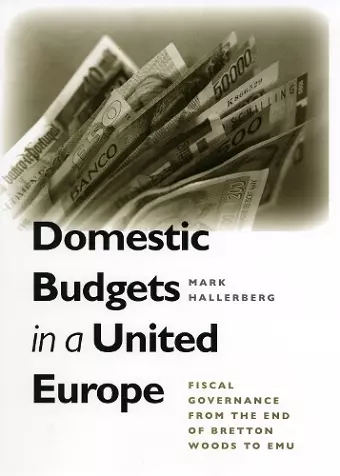Domestic Budgets in a United Europe
Fiscal Governance from the End of Bretton Woods to EMU
Format:Hardback
Publisher:Cornell University Press
Published:15th Sep '04
Currently unavailable, and unfortunately no date known when it will be back

Under European Monetary Union, member states lose the ability to steer their economies by manipulating monetary policy. Domestic Budgets in a United Europe, which explains the content, evolution, and effectiveness of fiscal institutions, will be the definitive account of European budget reform in the late twentieth century.Mark Hallerberg examines the making of budgets in EU countries from 1973 to 2000 and explores why those countries introduced fiscal rules when they did. In 1993, when the fiscal-policy criteria for monetary union were first announced, only Luxembourg and the Republic of Ireland would have qualified. In 1997, only Greece failed. Various explanations have been advanced for this rapid turnaround, including luck (a favorable economic climate reduced pressures on local budgets), accounting tricks, and the increasing pressures caused by international capital mobility. Underlying these various explanations is a basic skepticism about whether countries in the European Union actively worked to reform their national budgeting procedures. In rich case studies, Hallerberg shows that the member-states did indeed reform their budget institutions. Many of them, he finds, had started that process long before the formal signing of the Maastricht Treaty of 1991, making domestic changes that allowed them to qualify individually under EMU criteria.
"Mark Hallerberg's Domestic Budgets in a United Europe is an excellent contribution to the literature and the policy debate on how fiscal policies work. Its message is important: healthy public finances require appropriate institutions and these can differ significantly across countries. The analysis is sound: a consistent conceptual framework explaining the role and emergence of fiscal institutions is followed by a number of case studies. The book is timely and timeless: students, academics, policy analysts and policy makers will find an invaluable toolkit for assessing fiscal policies and institutions in Europe and abroad."—Ludger Schuknecht, European Central Bank
"Domestic Budgets in a United Europe contributes greatly to the literature on the politics of fiscal ' retrenchment' in comparative political economic research. In exemplary fashion Mark Hallerberg combines deductive theory building based on formal analysis, macro-quantitative empirical comparison, and process tracing through detailed case studies illustrating the diversity of mechanisms and outcomes in fiscal policy making."—Herbert Kitschelt, Duke University
"Domestic Budgets in a United Europe studies the making of fiscal policy over the past thirty years. Mark Hallerberg's analysis weaves together electoral, partisan, and cabinet-level factors to explain why governments sometimes allow budget deficits to spin out of control, while at other times they are able to exert surprising fiscal restraint. Domestic Budgets will be of great interest to students of political economy, European politics, and comparative politics."—Jeffry Frieden, Professor of Government, Harvard University
"Domestic Budgets in a United Europe makes a major contribution to our understanding of European fiscal policy generally and to the fiscal side of EMU specifically. This will be an influential book for those with an interest in these issues."—Mark Pollack, Temple University
ISBN: 9780801442711
Dimensions: 235mm x 155mm x 22mm
Weight: 907g
258 pages